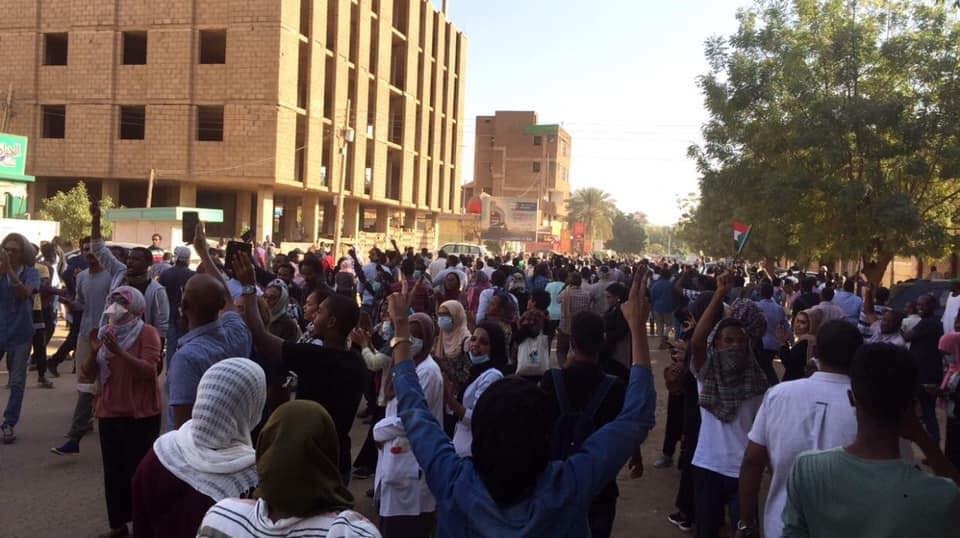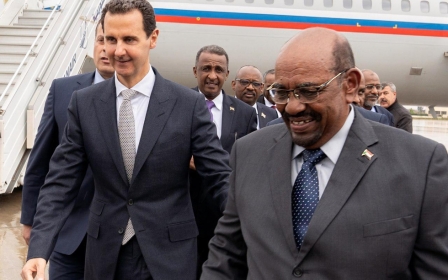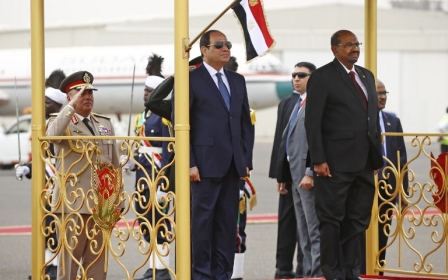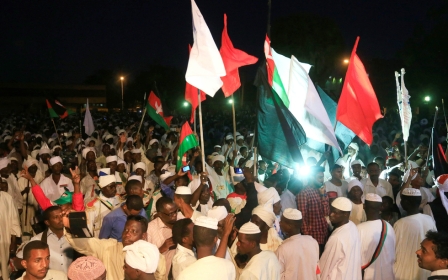Protester killed as anti-government anger hits Sudanese capital

A Sudanese protester was shot dead by security forces in downtown Khartoum, medical sources told Middle East Eye, as protests that have been spreading through the country hit the capital on Tuesday.
The sources said dozens of people had been injured by live fire used as well as tear gas and rubber bullets to stop the protesters reaching the presidential palace.
The protesters had gathered in downtown Khartoum after a call made by Sudanese trade unions to demand the end of President Omar al-Bashir's three-decade rule.
At least 37 protesters have been shot dead by security forces before Tuesday, according to Amnesty International, during seven days of large protests triggered by rising living costs but directed against Bashir's government.
The Sudanese Professionals Association called Tuesday's demonstration "to direct our voices and our strength towards removing this regime that has devastated us and divided our country."
MEE's reporter in Khartoum said police had cordoned off the roads in the capital and arrested dozens of protesters, who chanted for the "fall of the regime", "freedom" and "peacefully, peacefully against the thieves."
Translation: "Fierce attack by regime forces on peaceful protesters using live fire..."
"We have tired of this situation, you see these people here won't return home simply because they have nothing to lose," a protester in downtown Khartoum, who did not want to be named, told MEE.
"Bashir has just remembered now that the economy is bad after the protests erupted in the entire country, not because of the people but because he wants to stay in power," the protester said, noting how Bashir, who spoke on the crisis for the first time on Monday, has tried to downplay the protests as based purely on economic frustrations.
Another protester in Khartoum witnessed injured protesters being carried away and said he heard the sound of live fire being used by police.
"The police and army were surrounding Souq Arabi and beating up protesters and arresting them," he said. "They just throw tear gas and then when people scatter they come grab them or shoot live fire."
The Sudanese president struck a defiant tone in a speech delivered in al-Gezira state in central Sudan as the protests were ongoing, refusing to "surrender to our enemies".
"Some mercenaries serving the agendas of our external enemies are exploiting the lack of some commodities to sabotage our country," he said.
Bashir reportedly had to cut short his trip to al-Gezira, where he opened a school, and video emerged on social media of locals jeering him as he left town.
Translation: The scared Omar al-Bashir runs
A livestream broadcast early on Tuesday seemed to show the commander of the government Rapid Support Forces paramilitary, Mohammed Hamdan Dagolo, criticising Bashir.
Despite his speech, Sudanese security forces were heavily deployed throughout Khartoum ahead of the protests.
Amnesty International's regional deputy director Sarah Jackson said the Sudanese government's response was "extremely troubling."
“With dozens already dead, the government must rein in this deadly use of force and prevent more unnecessary bloodshed," said Jackson.
"Instead of trying to stop people from demonstrating, the authorities should be focusing on ending longstanding repression of human rights and resolving the economic crisis that have collectively precipitated these protests.”
The protests erupted in the northeastern town of Atbara last Wednesday, after weeks of tension over bread shortages, when protesters torched the ruling National Congress Party's offices.
Since then at least 15 towns and cities in Sudan have seen protests, according to mapping by Sudanese volunteers and verified by open source investigators Bellingcat.
While a tripling of bread prices and fuel shortages kindled the anger in Atbara, protests across the country have directed that outrage against Bashir and his government.
On Monday, for the second night in a row, Sudanese police used tear gas against fans leaving a football match immediately after they exited the stadium in Khartoum.
The Sudanese foreign ministry, according to the official Sudan News Agency (SUNA), briefed foreign diplomats on the crisis on Monday, describing the protests as only frustration over poor economic conditions.
Bashir spoke out against the protests for the first time on Monday, telling citizens to ignore "attempts to instil frustration".
Sudan's economy was hit hard when the south of the country seceded in 2011. With the secession, Sudan lost three-quarters of its oil output, a crucial source of foreign currency.
In October, Sudan sharply devalued its currency after the government asked a body of banks and money changers to set the exchange rate on a daily basis.
The move led to more price increases and a liquidity crunch, even while the gap between the official and black market rates has continued to widen.
At least three people were killed during similar protests against rising bread prices in January.
New MEE newsletter: Jerusalem Dispatch
Sign up to get the latest insights and analysis on Israel-Palestine, alongside Turkey Unpacked and other MEE newsletters
Middle East Eye delivers independent and unrivalled coverage and analysis of the Middle East, North Africa and beyond. To learn more about republishing this content and the associated fees, please fill out this form. More about MEE can be found here.




